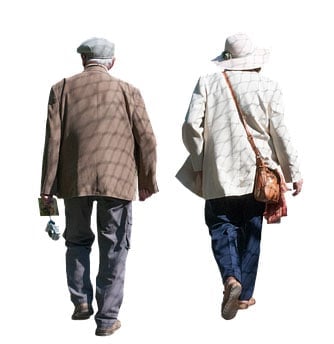
“I’ve fallen and I can’t get up”. We have all heard the phrase and seen the commercials but unless you are in a situation where this can happen to yourself or someone you love then you don’t truly grasp the catch phrase. Ultimately, the goal of these commercials is to let consumers know that Medical Alert Systems keep older people safe. Life Alert is the medical alert company that coined that phrase and you can check out Life Alert reviews here on our site.
The population in the United States is getting older by the day and that stat will continue to grow as the baby boomer generation is now in the over 55 age group. With the advancement in medicine and medical devices, diagnosed illnesses which were once considered a death sentence are now curable and allow the older population to remain as independent as possible. Medical alert systems are vital in protecting an older loved one by providing them the ability to get instant medical assistance when they are alone in their homes.
We are all living a much busier lifestyle as most homes have both partners working, there are children to take care of, and day-to-day activities seem to stretch into the evening hours. This makes it almost impossible to consistently check on loved ones that are older and living on their own. Making sure that they are taking advantage of modern technology, such as medical alert systems, can give all parties the peace of mind. In case of a fall or a medical emergency, help is just a push of a button away, which is usually a life or death situation.
 The National Institute on Aging says that one in three seniors over the age of 65 fall every year. Falls occur for many reasons and although the fall sometimes cannot be avoided, the fear of what will happen next is avoidable. An emergency response system can eliminate the fear before and after the fall.
The National Institute on Aging says that one in three seniors over the age of 65 fall every year. Falls occur for many reasons and although the fall sometimes cannot be avoided, the fear of what will happen next is avoidable. An emergency response system can eliminate the fear before and after the fall.
The cost of medical alert systems varies, and some Medicare plans will cover the expense. Medicare A& B, the basic of the Medicare plans does not typically cover a medical alert system, but some Medicare Advantage plans will cover such expenses. Additionally, most supplemental insurance plans do cover the cost. Medicaid, another government back medical insurance, does offer some plans that cover a medical alert system, but this will vary by state since this is a state funded insurance program for lower-income families or those with disabilities. It is important to check with your insurance provider to see what coverage you have for these types of devices.
Another important thing to remember when researching the medical alert system best for your loved one is to know their medical history. Although these types of devices can ultimately save a person with a heart condition by allowing them immediate medical attention, if your loved one has had a pacemaker or a defibrillator, some devices are not going to work for them as they can set off electromagnetic waves that could interfere with the implanted device for the heart. It is important to disclose all health issues with the company that you are going to purchase your device from in order to make sure that protection occurs inside and out.
There are so many options when purchasing a medical alert system. Some around the neck, some on the wristband and some are even able to detect a fall without the individual having to push the button. When a senior needs emergency help, they can push a button on their device which immediately contacts the monitoring center who then contacts the proper authorities. The senior can usually communicate with the monitoring center through the speaker on their medical alert system. This will keep the medical professionals aware of what situation they are dealing with when they arrive as well as calm the elderly person as they know that help is on the way.
The bottom line is that medical alert systems are saving the lives of seniors and allowing them to live independently for a longer period. AARP, the trusted source regarding anything that has to do with senior care, strongly endorses the purchase of a medical alert systems for seniors that are living on their own without caretakers. All the options on the market today are better than having nothing and doing research by family members on which type of device is best for their loved one is important. Medical alert systems are a necessity to protect older people. Please see 3 Main Types of Medical Alert Systems and Devices Explained, How Medical Alert Devices Can be a Lifeline for Aftercare, and Technology Devices that Make Life Easier for You and Your Loved One for more information.
Also, if you’re interested in learning about some new promising technologies that may be able to save you from a hear attack someday, please see: Can Amazon Alexa Help Detect a Heart Attack?
In Post Image Credit: cozmicphotos / Pixabay


